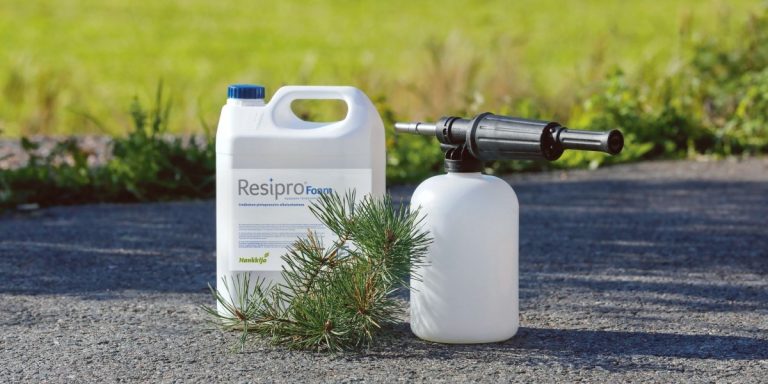
Biosecurity is a key part of livestock farm welfare. It covers all measures that prevent the spread of infectious diseases between animals, humans, and the environment. Especially on large production farms, disease pressure is higher, making hygiene management even more important. Climate change and globalization increase the risk of pathogen transmission, which highlights the importance of effective hygiene. Thorough surface cleaning is an essential part of biosecurity. Organic matter, such as dust, manure, and other dirt, provides a breeding ground for microbes, which increases infection risks. Without proper cleaning, disinfection may also be ineffective, as microbial protective biofilms can block disinfectants from effectively reaching the surface.
Resipro® Foam – a new foam cleaner to support hygiene
Hankkija has studied the properties of resin acids from rosin for years in collaboration with leading experts. Based on these studies, the Resipro® Foam cleaner was developed, designed specifically for efficient cleaning of livestock facility surfaces. In addition to its strong cleaning performance, the product’s key features are domestic origin, safety, and eco-friendliness: it is safe for users, farm animals, and different farm structures.
Resipro® Foam – patented foam cleaner for livestock facility hygiene
Effectiveness measured with the ATP method
The effectiveness was evaluated using ATP testing, which measures microbiological and organic contamination on surfaces. ATP is an energy molecule found in all living cells, such as bacteria and fungi, and is therefore also present in organic dirt. The measured ATP level indicates surface cleanliness, with the luminometer’s light emission results expressed in relative light units (RLU). The method is widely used for assessing cleanliness in food facilities and is also well-suited for evaluating the hygiene of surfaces used with animals. Clean surfaces reduce infection risks, as dirty surfaces provide microbes with a favorable environment for growth.

The test objects included a plastic dog transport crate, a plastic puppy pen base, and a metal sheet. The tested plastic and metal surfaces were divided into sections: some were washed with water only, others with Resipro® Foam. Cleanliness was measured with ATP testing, and the results were expressed as percentages relative to control samples. At the starting point, the surfaces were already visually fairly clean compared to the level typically observed in livestock facilities. After washing, however, the Resipro® Foam areas appeared brighter, and especially the porous plastic surface was visibly cleaner after Resipro Foam cleaning.
Results confirm effectiveness
The ATP measurements confirmed the visual observations: after Resipro® Foam cleaning, ATP levels on both plastic and metal surfaces were lower than after water cleaning. On the metal surface, cleanliness after Resipro® Foam cleaning was up to 15 times higher compared to water cleaning (Figure 2). On the plastic surfaces of the dog transport crate, the difference was also significant—on the inner surface, nearly three times cleaner than with water cleaning (Figure 3). A statistically significant difference was found between Resipro Foam and water washing.

ATP measurements showed that Resipro® Foam cleaning reduced residual organic and microbial contamination on surfaces compared to water cleaning. A clean environment supports animal welfare and safety, as microbes and dirt can increase infection risks. The use of Resipro® Foam helps maintain hygienic conditions in animal facilities and transport equipment, creating a cleaner, safer, and more comfortable environment for both animals and farm workers.

In the future, cleaning efficiency will be evaluated more extensively in farm environments to gain a broader understanding of its effects on different surface materials and under real operating conditions. This supports ongoing efforts to maintain more hygienic and safer livestock facilities.





